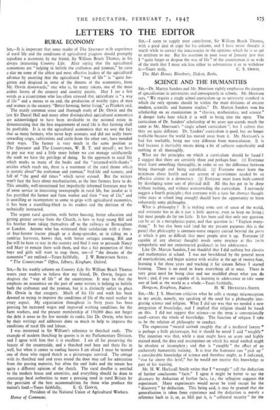LETTERS TO THE EDITOR
RURAL ECONOMY
sm,--It is important that some reader of The Spectator with experience of rural life and the conditions of agricultural progress should promptly repudiate a statement by my friend, Sir William Beach Thomas, in his always interesting Country Life. After saying that the agricultural economists are "helping to belittle the craftsman and yeoman," he casts a slur on some of the ablest and most effective leaders of the agricultural advance by asserting that the agricultural "way of life" is "quite for- gotten and despised in some of the dreams of the economists, from Mr. Orwin downwards," one who is, by many tokens, one of the most ardent lovers of the country and country people. May I say a few words as a countryman who has often stressed that agriculture is "a way of life" and a means to an end, the production of worthy types of men and women in the country. "Better farming, better living," as Plunkett said.
The sturdy common sense and thorough study of Dr. Orwin and the late Sir Daniel Hall and many other distinguished agricultural economists are acknowledged to have been invaluable to the national estate in demonstrating that the first requirement of rural life is that farming shall be profitable. It is to the agricultural economists that we owe the fact that so many farmers, who never kept accounts and did not really know rewarding crops, cultivations and cattle from the other sort, have mended their ways. The farmer is very much in the same position as The Spectator and The Countryman, W. B. T. and myself ; we have to pay our way and a little more before we can manage satisfactorily the work we have the privilege of doing. In the approach to rural life which marks so many of the books and the "returned-with--thanks" articles which reach me, there is a treatment cf the rural theme which is ecstatic about" the craftsman and yeoman," bird-life and scenery, and full of "the good old times" which never existed. But the writers won't face the facts about mechanisation, as the best farmers have to do. This amiable, well-intentioned but imperfectly informed literature may be of some service in interesting townspeople in rural life, but insofar as it has prettified the farmer and farm worker and their "way of life," and is unwilling or incompetent to come to grips with agricultural economics, it has been a srumbling-block to its readers and the derision of the technically instructed.
The urgent rural question, with better housing, better education and getting greater service from the Church, is how to keep young Bill and his brother from taking themselves off to the railways or Birmingham or London. Anyone who has witnessed their satisfaction with a three- or four-furrow tractor plough or a dung-spreader, or in riding on a combine harvester, knows that, with better cottages coming, Bill and Joe will be keen to stay in the country and find it easy to persuade Nancy and Mary to remain there with them, and that a fair proportion of their boys and girls will want to stop there, too—if "the dreams of the
economist" are realised.—Yours faithfully, J. W. ROBERTSON Scorn "The Countryman" Office, Idbury, Kingham, Oxford.
Sitt,—In his weekly column on Country Life Sir William Beach Thomas wants your readers to believe that my friend, Dr. Orwin, forgets or despises the "way of life" of the countryman. It may be that the emphasis on economics on the part of some writers is helping to belittle both the craftsman and the yeoman, but it is distinctly unfair to place Dr. Orwin in that category. Much of his life and work has been devoted to trying to improve the conditions of life of the rural worker in every aspect. My organisation throughout its forty years has been pressing for increased wages and improved working conditions for the farm workers, and the present membership of 150,000 does not forget the debt it owes to the few outside its ranks, like Dr. Orwin, who have by their writings and addresses done so much to help to improve the conditions of rural life and labour.
I was interested in Sir William's reference to thatched roofs. The example of modern thatching he quotes is in my Parliamentary Division, and I agree with him that it is excellent. I am all for preserving the beauty of the countryside, and a thatched roof here and there fits in , well, but when it comes to roofing houses am afraid I must be termed one of those who regard thatch as a picturesque survival. The cottage with its thatched roof and roses round the door may call for admiration from the passing motorist, but often the roof leaks and the tenant has quite a different opinion of the thatch. The rural dweller is entitled to the modern house and amenities, and everything should be done to encourage local authorities to meet a pressing need in rural Britain by the provision of the best accommodation for those who produce the
nation's food.—Yours faithfully, E. G. Goocti, President of the National Union of Agricultural Workers. House of Commons.


































 Previous page
Previous page